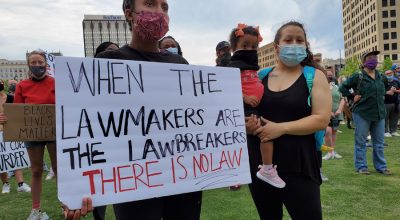


Where rights secured by the Constitution are involved, there can be no rule making or legislation which would abrogate them. — Miranda v. Arizona, 384 U.S. 436, 491, 86 S. Ct. 1602, 1636, 16 L. Ed. 2d 694 (1966)
“We are announcing our bias in favor of CV-19 lockdown.”
“We are declaring our partiality for the existing administrative regime.”
By David Tulis / NoogaRadio 92.7 FM
Tennessee chief Justice Jeff Bivins is not quite as explicit in his order requiring chin diapers on all people in the court system — attorneys, judges, witnesses, plaintiffs, defendants.
But his rule ordering face masks in light of the CV-19 panic is effectively making these claims.
His rules violate fundamental rules of law and put the judiciary in a position of partisanship and taking sides, especially in upcoming cases that defy the executive orders by governor and mayor that are being applied and enforced upon private people in their private doings.
The matter of face masks and “social isolation” in the courts themselves are crucial to the rights of the people and their defense in the judicial system.
But the courts have effectively turned against the people in favor of global policy and “compelling state interest.”
Tennessee courts have entered the administrative realm of rulemaking in their operation, rather than pursuing the lofty common law objectives for courts outlined in the constitution. They have rejected the open courts mandate in the constitution by imposing “emergency” rules one after another upon the courts, with particular partiality against challenges to the regime of Gov. Bill Lee. The world of administrative law is unitary, absolutist and unappealable.
Judge Bivins effectively orders petitioners targeting CV-19 illegality to yield their claims before entering the court security gate. They yield their ground because the court imposes a priori the mask rule, “social distancing,” and empty galleries.
The courts impose an uneven playing field on any challenge to the “new normal” of CV-19 rulemaking that abrogates constitutional protections.
Judge Bivins’ taking sides violates the rights of the people to justice and acts to give the appearance of partiality.
Consider this paradox: Rulemaking for CV-19 emergency is opposed in sessions court or circuit or chancery — and the appeal is heard by judges who live out the opposite argument to any pleadings by an oppressed citizen.
‘Justice administered without sale’
The right to a fair and impartial trial is guaranteed in the Tennessee bill of rights, “Section 17. That all courts shall be open; and every man, for an injury done him in his lands, goods, person or reputation, shall have remedy by due course of law, and right and justice administered without sale, denial, or delay.”
Meaning what?
The courts are to be open and fair; they promise a “remedy by due course of law” provided in a venue “without sale.” These words imply judicial impartiality, a longstanding rule.
“[G]reat care must be taken by a judge to ‘always be calmly judicial, dispassionate and impartial. He should sedulously avoid all appearances of advocacy as to those questions which are ultimately to be submitted to the jury.’ Frantz v. United States, 62 F.2d 737, 739 (6th Cir. 1933). As good a summary as any of the applicable law was recently stated by Judge Pierce Lively in United States v. Frazier, 584 F.2d 790, 794 (6th Cir. 1978): ‘The basic requirement is one of impartiality in demeanor as well as in actions.’” United States v. Hickman, 592 F.2d 931, 933 (6th Cir. 1979)
With the mask rule, it appears “potential prejudice lurks behind every intrusion” of the judge into the case, his face bearing witness of the side he has taken because he lacks an “objective demeanor.”
‘Absolute probity’
If you are under siege in a local court over a CV-19 offense, I suggest you demand the recusal of a judge whose adherence to the rules of his superiors shows visually is partiality and a commitment to the lockdown-mask regime of Gov. Lee and county mayor Jim Coppinger.
“The citizen’s respect for judgments depends in turn upon the issuing court’s absolute probity. Judicial integrity is, in consequence, a state interest of the highest order.” Republican Party of Minn. v. White, 536 U.S. 765, 793, 122 S.Ct. 2528, 153 L.Ed.2d 694 (2002) Caperton v. A.T. Massey Coal Co., 556 U.S. 868, 889, 129 S. Ct. 2252, 2266–67, 173 L. Ed. 2d 1208 (2009)
“[O]ne of the core tenets of our jurisprudence is that litigants have a right to have their cases heard by fair and impartial judges.” Davis v. Liberty Mut. Ins. Co., 38 S.W.3d 560, 564 (Tenn.2001) (citing Kinard v. Kinard, 986 S.W.2d 220, 228 (Tenn.Ct.App.1998)). In fact, “ ‘it goes without saying that a trial before a biased or prejudiced fact finder is a denial of due process.’ “ Id. (quoting Wilson v. Wilson, 987 S.W.2d 555, 562 (Tenn.Ct.App.1998)). Judges must always act “ ‘in a manner that promotes public confidence in the integrity and impartiality of the judiciary’ and ‘shall not be swayed by partisan interests, public clamor, or fear of criticism.’ ” Id. (quoting Tenn. Sup.Ct. R. 10, Canon 2(A), 3(B)(2)). It is not only important that justice be administered impartially, but that the public perceives it as being done so. See id. “If the public is to maintain confidence in the judiciary, cases must be tried by unprejudiced and unbiased judges.” Reese v. Klocko, No. M200702486COAR3CV, 2009 WL 910220, at *5 (Tenn. Ct. App. Apr. 3, 2009) (emphasis added)
When a judge is biased, and appears to be biased, the venue is marred by what another court opinion calls structural constitutional error.
“The right to a fair trial before an impartial judge is a fundamental constitutional right.” State v. Benson, 973 S.W.2d 202, 205 (Tenn. 1998) (emphases added). However, “most questions concerning a judge’s qualifications to hear a case are not constitutional ones, because the Due Process Clause of the Fourteenth Amendment establishes a constitutional floor, not a uniform standard.” Bracy v. Gramley, 520 U.S. 899, 904 (1997). (emphasis added)
“Rather, these questions are “answered by common law, statute, or the professional standards of the bench and bar.” Id. The floor established by the Due Process Clause simply “requires a ‘fair trial in a fair tribunal,’ before a judge with no actual bias against the defendant or interest in the outcome of his particular case.” *** A trial judge’s misconduct amounts to a structural constitutional error when the misconduct affects the judge’s impartiality. Put another way, a trial judge’s misconduct constitutes a structural error when that “conduct pierces the veil of judicial impartiality.” People v. Stevens, 869 N.W.2d 233, 242 (Mich. 2015). Cornwell v. State, No. E201600236CCAR3PC, 2017 WL 5957667, at *16 (Tenn. Crim. App. Dec. 1, 2017) (emphasis added)
Action steps to restore liberty
If you are arrested by an agent serving Gov. Lee, Mayor Jim Coppinger or any other mayor, it will have to be under a warrant, pursuant to the meaning of “public offense” in Tenn. Code Ann. § 40-7-103, arrest by warrant without officer. Arrest for not wearing a mask requires a warrant, and violation of the constitution and this law is a due process violation that you should ask be sufficient to warrant dismissal of the case against you.
If you are arguing the right to be free from lawless edicts, I suggest you be willing to face arrest or citation. Appearing in court without a mask is forbidden, so if you stand your ground on mask, you will be ruled against in abstentia. So you must file documents ahead of time demanding a judge who is not part of the illegal rulemaking that controls the court and biases the system against your liberty.
Your pleading should be for a disqualification of any judge who, in mask, requires you to have a mask before hearing your argument against the mask rule. If no such judge is available, then I suggest you argue that the claims made in the case against you cannot be satisfied in the court, as it is incapable of rendering a just judgment. I would petition for the judge to dismiss the case ministerially.
A petition for dismissal ministerially is done because he doesn’t have subject matter jurisdiction to hear the case in the first place. Christie Mahn, Alex McVeigh, Gerald Webb, Lila Statom and Gary Starnes — the Hamilton County sessions judges — lack subject matter jurisdiction, as there is no lawful authority to bring the civil or criminal claims against you in the first place. I have detailed this lack of authority elsewhere.
Note that I am not an attorney, don’t practice law, don’t have a law practice or law business, and don’t give legal advice. This analysis is from a lifelong journalist with a master’s degree in English and decades of work in the newspaper, radio and Internet press.
You are being shafted. You are being shafted. You are being shafted. Let’s fight back.
Protest planned Sunday at noon





It’s the rule of men. BAR association has destroyed the rule of law and now it’s mere whim as was said in that decision they have described their agenda, intent and character and themselves as “the ancient gods of bounty” and you’re going to give them what they want, now it’s not only theft of the fruits of your labor it’s slavish bowing down to arbitrary capricious demands
“To depart from the law is to wander without a guide” there is no law to restrain their madness, crazy people can see craziness in others they just cannot recognize sanity.
And you ARE going to see the mental illness overtake the people on full display. You think the protesters were nuts watch the lawyers descend into complete irrationality. And the cops are just as brainless and have no capacity to respond or act according to any moral restraint.
The time between cause and effect is rapidly closing in because Scripture said “unless those days had been shortened no flesh would be saved alive” so their destruction of a necessary institution commanded by God will not be allowed to linger.
This is the powerful removal of access to justice and a sign of the short interval to societal collapse, it’s highly dangerous to innocent members of society.
Survival of the fittest! We need to let this “seasonal flu outbreak” thin out the old and weak from among us.
If we outrun our ICU capacity, all the better!